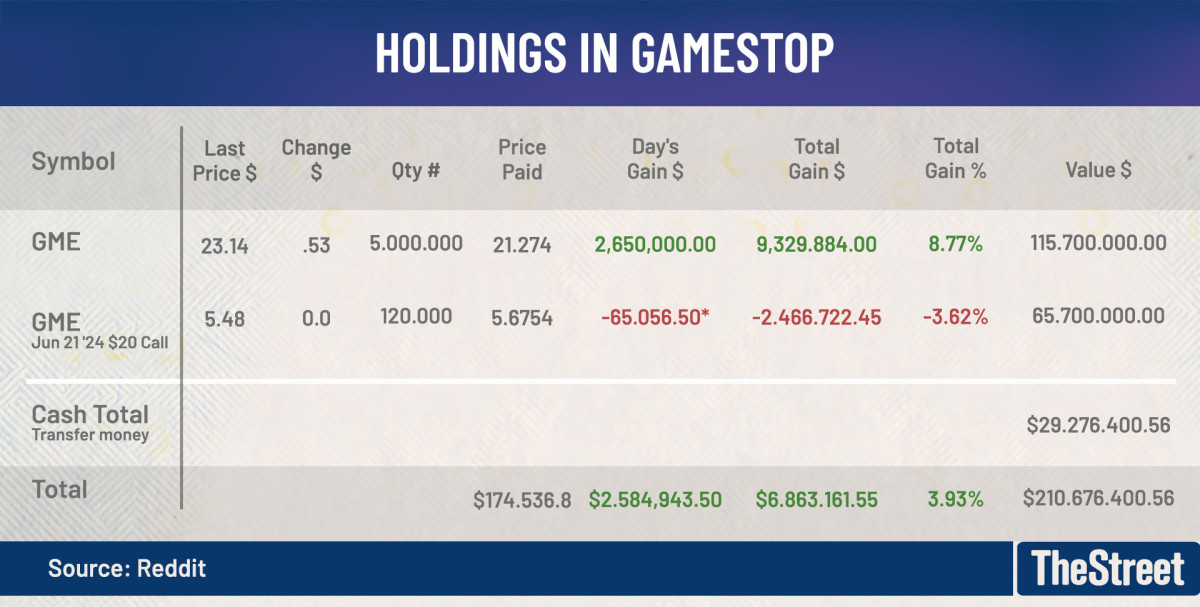
GameStop shares retreated in early Tuesday dealing but remain one of the most active names in the market, as reports suggest the Securities and Exchange Commission is looking into options trades tied to the videogame retailer and a noted investor revealed a new bet against the surging meme stock.
GameStop (GME) shares added around $2 billion in market value yesterday following a 21% surge tied to weekend social-media posts from the influential retail investor Keith Gill, who is better-known as Roaring Kitty from the WallStreetbets channel on Reddit.
The stock in fact has added more than $3 billion in value since May 9, when Gill broke his social-media silence and posted an image that investors tied to GameStop's fortunes.

An account tied to Gill on the Reddit platform, meanwhile, indicated a weekend position of 5 million GameStop shares, as well as call options enabling him to potentially purchase 12 million more.
By the close of trading on Monday, those positions were valued at $289 million, making him the fifth-largest investor in the Grapevine, Texas, retailer and producing a single-day gain of around $79 million.

Some investors, however, are starting to push back against the outsized influence of the former MassMutual executive, while other reports suggest at least one trading platform is looking at limiting his activities amid the surge in overall volumes.
Roaring Kitty platform ban?
The Wall Street Journal reported Tuesday that the E-Trade division of investment bank Morgan Stanley has had internal discussions regarding Gill's account.
The paper also reported that the SEC was looking into some of the recent trades linked to GameStop. The report came after it was revealed that Gill purchased a large amount of call options prior to his early May return to social media, which sparked a 180% surge in the share price.
Related: Roaring Kitty reveals staggering GameStop stock buy
In the meantime, Andrew Left, a noted short seller and founder of the Citron Research hedge fund, told Bloomberg TV that he had renewed his longtime bet against GameStop, after closing out a losing position at the end of May.
Short-sellers bet against a company by borrowing shares and selling them. If the price of the stock declines, the short-sellers will buy back the shares at a lower price, return the borrowed stock (while paying a fee), and pocket the difference.
GameStop, $GME short volume is close to its 2021 levels over the last three weeks. pic.twitter.com/sq5W69dPAH
— unusual_whales (@unusual_whales) June 4, 2024
The size of his new bet was not disclosed, but Left subsequently detailed part of his reasoning in a series of social-media posts late Monday. He called Gill's actions "more like manipulation" and lacking a "solid investment thesis."
"What made (Gill) interesting initially was his authenticity," Left said. "Now, with GameStop, he posts with a large account and a significant near-term option positions. This time it feels different."
Left also suggested Gill may have an unnamed financial backer.
"There's no way he made this size trade alone," Left alleged. "His reported finances don't support his trade."
GameStop's struggling business
The bullish signals from Gill's trades have been difficult to justify as well, given that GameStop has delivered only two profitable quarters over the past three years.
Its most recent earnings report, published in March, showed holiday-quarter sales fell nearly 20% from 2023 levels to $1.79 billion, while the group unveiled a fresh round of job cuts.
The group, which is led once again by the famed investor Ryan Cohen, has struggled to articulate its intended transition from physical-store sales to online purchases, where an increasing amount of video game transactions take place. The retailer has kept analysts in the dark regarding its investment plans.
Related: Keith Gill’s net worth: How much did the “Dumb Money” investor make on GameStop?
GameStop did note in a March SEC filing that it continued to receive "a high degree of media coverage that is published or otherwise disseminated by third parties, including blogs, articles, message boards and social and other media."
"This includes coverage that is not attributable to statements made by our officers or associates. Information provided by third parties may not be reliable or accurate and could materially impact the trading price of our Class A Common Stock which could cause stockholders to lose their investments," the company added.
That didn't stop the group from cashing in on its early May surge, however, with Cohen directing the sale of 45 million new common shares that raised around $933 million.
GameStop said the funds would be used for new investments or acquisitions. The company late last year had given Cohen discretion to "invest in equity securities" as part of a new management brief.
More Wall Street Analysts:
- Analysts compute new HP stock price target after earnings
- Analysts retool C3.ai stock price target after earnings
- Analysts reboot Dell stock price targets ahead of earnings
Investor attention to GameStop options trading
GameStop shares were recently marked 5% lower at $26.60. That move would leave the stock's one-month gain at around 63% and value the retailer at around $8.12 billion.
Investors will also be closely tracking action in the market for GameStop options, including calls, which give the buyer the right, but not the obligation, to buy shares of a company at a certain price at some specified point in the future.
Option sellers, meanwhile, will often buy the underlying stock in the open market as its price moves higher, in order to hedge their risk. This can creating a virtuous, but potentially ephemeral, circle of ever-higher prices in what is often referred to as a gamma squeeze.
The unwinding of those moves, conversely, can create big downside risks for a stock that has been driven higher by the call-option buying.
Related: Veteran fund manager picks favorite stocks for 2024







